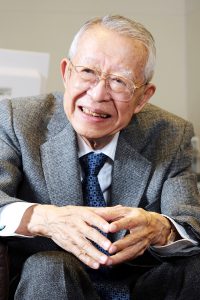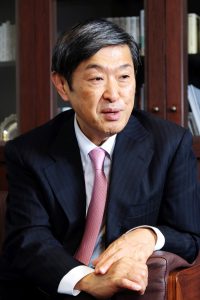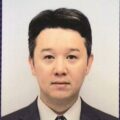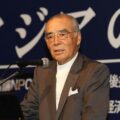Japan Is Set for A New Dimension of International Cooperation― A perspective for future international cooperation
Future course for Japan to take

Yamazaki Masakazu
PHOTO: AIZAWA TADASHI
Yamazaki Masakazu: On the domestic front today, things surrounding our society seem to be remaining stable at a level that has never been experienced before. This observation does not take the form of a commonly shared view in the media, however. Japan was engaged in a war when I was at elementary school. Compared with those gloomy days that I had to spend as a child during the war, our current era is so much better. It is true that our economy is struggling to take off in one way or another, with growing concern among us regarding our future amid the progress of an aging population with a declining birthrate. But if you look at the bright side, you will find that the jobless rate for young adults remains low and our public safety standards are by far the highest compared with other nations. In addition, the Abe Administration appears to be remaining stable enough to maintain its current political status. I believe that there is much more room left for Japan than most people think to contribute to the international community. By doing so, Japan could remain a nation that will be even more beloved and considered to be friendly by people from other countries, ensuring that it keeps itself from being attacked by any other nation. I think that the next several years will be most crucial for Japan in that regard.

Kitaoka Shinichi
PHOTO: AIZAWA TADASHI
Kitaoka Shinichi: Over the past three years, the Abe Administration has made significant progress in dealing with two major political agenda items that have remained as a persistent Achilles’ heel for Japan: national security and historical perception. I myself have tried hard to help achieve this progress, serving as Chair of the Advisory Panel on National Security and Defense Capabilities, PM Office, Acting Chair of the Council on Reconstruction of a Legal Basis for Security, PM Office, and Acting Chair of the Advisory Panel on Japan’s Role and the World Order in the 21st Century, PM Office. The next step for Japan to take is to encourage more proactive contributions to world peace. Max Weber once said that key countries must find themselves as determinants with respect to the future course of world history. I personally do not want to see Japan being completely out of the picture in the international community, nor should Japan find itself trapped in such a situation.
Yamazaki: I believe that international cooperation will have a significant meaning for Japan, and JICA will have greater responsibilities in that regard. I feel extremely encouraged that a great scholar such as yourself with experience serving as an ambassador to the United Nations has become President of JICA.
Kitaoka: Thank you.
Yamazaki: I understand that you have been to quite a few places around the world already in the past three months.
Kitaoka: I make a trip once a month. My first visit was to Ethiopia and Kenya, which was followed by visits to Nepal and Bhutan. In Bhutan, I had the privilege of meeting with the former King, the present King, and the Prime Minister. Japan is currently serving as a non-permanent member of the UN Security Council, hosting important events in rapid succession this year, including the G7 Summit Meeting in May and the Tokyo International Conference on African Development (TICAD) in Kenya this summer (co-hosted by the African Union). Japan’s diplomacy is facing a crucial test this year. Japan’s official development assistance (ODA) has indeed kept decreasing in budget amount over the past sixteen years. I have been heavily involved with the efforts to raise the budget amount of assistance, resulting in a 1.8% increase this year.
Japan’s identity in international cooperation
Yamazaki: I was amazed to realize that it has been over sixty years since Japan launched its ODA, and that JICA has been around for so many years since it was established more than fifty years ago, when it was known as the Overseas Technical Cooperation Agency (OTCA). Last year marked the seventieth anniversary of Japan’s defeat in the Second World War, meaning that Japan started providing development assistance to other nations when we were still in the very early stages of economic recovery from the war-torn years.
Kitaoka: I am amazed that Japan was able to implement such an initiative despite its economic difficulties. Japan’s ODA was launched following its participation in the Colombo Plan in 1954. In 1962, OTCA was established. The Japan Overseas Cooperation Volunteers (JOCV) was launched in 1965. Japan’s development assistance played a significant role, particularly in the East Asian nations during the period when they achieved economic development and democratization with political stability. It goes without saying that those achievements were largely attributable to the efforts made by the local citizens.
Japan is set for a new dimension in international cooperation
Yamazaki: It is interesting that what used to be called “assistance” is commonly termed “development cooperation” instead these days. Is this a trend that is now seen globally?
Kitaoka: Traditionally, the word “cooperation” has been more commonly used than “assistance” when it comes to Japan’s ODA. “Assistance” carries a connotation of providing unilateral help in a manner that sometimes sounds somewhat condescending. In contrast, “development cooperation” sounds more mutual, involving interactive efforts that are beneficial to Japan as well. Furthermore, the term “socioeconomic development” is more commonly used today instead of “economic development.” I was amazed to realize that the term “socioeconomic development” began to be used in Japan’s ODA program even before the Sato Administration adopted this terminology. I previously thought that “socioeconomic development” was first coined by the Sato Cabinet at the time.
Yamazaki: This story tells us about Japan’s national character. Don’t you think so?
Kitaoka: Yes. I think that we should promote Japan’s presence further on the strength of this national character in the field of international cooperation. A shift is underway in the global economic activities toward the Asia-Pacific and Indian Ocean regions. Until the early nineteenth century, however, China and India had long been the major economies of the world. Is our future going to be like our past in terms of our geographical presence regarding the world economy? The answer to this question is definitively “No.” As you pointed out in your book entitled Kindai no yogo, mankind has inherited a significant legacy of human rights, democracy, freedom of speech, and the rule of law over the recent centuries. We must maintain the values of the modern legacy one way or another. European or American values based on the modern legacy seem to be a little too rigid in nature. I think it’s necessary for them to redefine their values in a slightly more flexible manner.
Yamazaki: I agree. It seems that the cause of disputes happening around the world today can be traced back to the settlements that were then considered favorable by the powerful Western nations. Islamic State is a typical case in point. ISIS soldiers attempt to dominate the entire world with their own sense of morality. Paradoxically
, a radical and hasty process toward democratization would result in a disaster like the Arab Spring.
Kitaoka: Few of the recent undertakings of the peace process driven by the United Nations has been successful. Deploying PKO troops in hot spots in order to stabilize conflict situations followed by democratic elections does not always lead to a long-lasting system. Furthermore, the United Nations principle stipulates that any person who commits an act that constitutes a crime is liable to be punished. Based on this, an International Criminal Court (ICC) prosecutor presented a case against the Sudanese President for genocide in Darfur. In fact, however, the indictment had no effectiveness, and as a result he expelled many of the NGOs from the country and the situation of the country subsequently became even worse.
We will never overlook the extreme suppression of human rights such as the death penalty without trial or torture, but we sometimes need to condone certain limitations of political freedom, as fundamental human rights and the acquisition of freedom will need a considerable amount of time to be achieved. This is exactly where Japan comes into play.
Yamazaki: Among other countries, Japan provided the most significant support to Indonesia under the Sukarno regime and Myanmar (formerly Burma) before the reforms were set in motion. Consequently, both of these countries developed economically, achieving stability in political situations. A modern nation or a free democratic country essentially embodies contradiction. For example, freedom, equality and friendship as symbolized by France’s national flag contradict one another in terms of significance. It is obvious that freedom and equality contradict each other when it comes to economics. Friendship does not go with the concept of an individual’s independence and dignity or urban anonymity. It is hard to choose between the survival of the community and the independence of the individual in terms of priority. We know that it is a tough choice from our experience with the restoration process in the devastated areas following the Great East Japan Earthquake. People around the world suffer from inconsistencies like these and feel frustrated about them. I would suggest that we become tolerant about the inconsistencies in a constructive manner.
Kitaoka: People of different civilizations must continue living together in harmony on the basis of values gained over the recent centuries. Japan could serve the world of multiple civilizations as a facilitator, I think. The year 2015 saw significant events occur in terms of international cooperation. World leaders adopted Sustainable Development Goals (SDGs) at the United Nations in September, calling for action to achieve seventeen goals. Most of these goals are consistent with the initiatives currently being undertaken by JICA in pursuit of the reduction of poverty and a healthy life for all. In fact, JICA has made a significant contribution with heavy involvement in formulating the SDGs. One of the goals includes the line “inclusive and sustainable economic growth.” The word “inclusive” specifically means efforts aimed at leaving no one behind. Everywhere around the world, the most vulnerable people always include the poor, children, the afflicted, and women, who are easily left behind. Japan has highly skilled knowhow and expertise acquired through a range of initiatives related to development cooperation that could be best utilized for the benefit of those people, and that is where JICA comes in.
An approach for Japan to take regarding development cooperation
Yamazaki: When it comes to ODA, it was often said in the past that Japan was the largest donor in the world, but it appears that Japan has decreased its ODA budget significantly in value in recent years amid the economic downturn and the public criticisms related to the budget spending.
Kitaoka: I must take this opportunity to correct people’s misunderstandings about Japan’s ODA. Most Japanese people seem to believe that Japan assumes full responsibilities when it comes to providing ODA. When an opinion survey is conducted asking people what percentage of Japan’s national budget they think is spent on ODA, over 60% of the respondents usually answer that they believe that more than 3% of the national budget is used for that purpose, and surprisingly enough, over 20% of them answer that they think Japan spends more than 6% of its national budget on its ODA program. However, I must say that those views are far from the truth. ODA accounts for only 0.5%–0.6% of Japan’s general account budget. The share of its ODA disbursements in Gross National Income (GNI) is less than 0.2%, which is a low percentage among the figures for the member countries of the Development Assistance Committee (DAC) of the OECD.
Yamazaki: The numbers you have just cited sound unexpectedly low to me.
Kitaoka: The 0.7% ODA/GNI target has been repeatedly re-endorsed at the highest level at international aid and development conferences driven by the OECD or the United Nations. NATO member countries are currently required to meet the guideline of spending a minimum of 2% of their Gross Domestic Product (GDP) on collective defense and security. To take the U.K., for example, it not only commits to meeting the NATO investment pledge of spending 2% of GDP on defense, but it has also passed a bill that enshrines in law its commitment to spend 0.7% of its GNI. By contrast, Japan’s defense spending has remained below 1% of GDP. Even coupled with the ODA disbursements, Japan’s spending is less than 1.2% of its GNI. This in no way justifies a view that Japan assumes full responsibilities as an industrially advanced nation. It is true, though, that Japan’s ODA has remained significant in value because the related disbursement amount is usually calculated as a certain percentage of the country’s significant economic scale. In fact, ODA in terms of value is considered much more meaningful by recipient countries than its percentage share is in terms of GDP, but it is also true that Japan’s per capita ODA spending is lower when it is compared to that of other countries. During the 1990s, Japan provided a significant amount of assistance contributions, being ranked as the largest ODA donor in the world for nearly ten years. Japan’s ODA budget continued increasing in amount during the period from the 1980s through the middle of the 1990s. I think it expanded even more significantly in dollar terms, particularly because of the appreciation in the yen’s value that started in the latter half of the 1980s. However, Japan is ranked fifth in the world as an aid donor in terms of ODA net disbursements today.
Yamazaki: That prompted the Japanese Government to implement a structural adjustment in the direction of its ODA policy, shifting from emphasizing quantity to quality. Am I right?
Kitaoka: Our serious and persistent efforts have paid off and achieved a successful shift toward quality in the face of the budget cut for the ODA disbursements. Currently, the Abe Administration is remaining focused on aggressive initiatives such as exporting the bullet train system, promoting Quality Infrastructure Investment as its priority agenda. Nobody can deny the significance of infrastructure. In fact, Japan has made significant achievements to date in building infrastructure in South East Asia and other areas around the world. But things are different now. Japan can no longer afford to remain a top ODA provider in the world in the field of infrastructure assistance. China has already grown more than twice as large as Japan in terms of GDP. Furthermore, China is a one-party state, giving its government a relative advantage in making decisions quickly on undertaking infrastructure exports without cumbersome procedures. By contrast, Japan’s infrastructure exports are always subject to very strict enviro
nmental and social impact assessment, which takes a certain time to make a project accountable.
Yamazaki: Am I correct in my understanding that Japan will not be able to maintain its presence in the field of international cooperation if it continues to rely solely on infrastructure exports in the future?
Kitaoka: Japan’s approach to its international cooperative initiatives is typically based on dialogues with the recipient country in search of solutions that will best suit their needs through mutual efforts. In other words, Japan’s approach is not solely aimed at providing tangible goods, but it is more focused on inventing and establishing solutions that will help the recipient country to achieve self-sustainable development. Japan appears to have found itself equipped with such knowhow through long years of experience with its international cooperative efforts.
Yamazaki: Previously, Japan’s ODA program has often been derided as being almost like an order-taking business. Those who criticize Japan’s approach used to say that Japan takes orders locally following a visit to the recipient country, while America acts more strategically with the aim of localizing democracy, a universal principle in the country. More recently, however, people seem to have begun realizing that Japan’s approach has become more focused on having dialogues in search of the best solutions for the recipient country, not merely “taking orders.” Such dialogues may often involve activities such as proposing guidelines or increasing awareness among the local people. In that sense, I think Japan’s ODA program has developed to almost an ideal level through the sixty years of its history. I often hear about the styles of assistance provided by China. They provide huge assistance in terms of value, but on the flip side, they always prioritize their own national interests in foreign aid. For example, they bring Chinese workers en masse into a developing country to build infrastructure there, and they pull out the workers as soon as the project is finished. Only those Chinese workers get paid, leaving no monetary benefits or knowhow with the local people.
Kitaoka: I think China has undergone some changes lately in its approach to international cooperation. It hosts the Forum on China-Africa Cooperation (FOCAC) every three years, a collective dialogue that is comparable to the Tokyo International Conference on African Development (TICAD). Most recently, FOCAC was held in December 2015, where the Chinese Government pledged an ODA investment almost twice as large in value as the assistance pledged by Japan at TICAD. Having said that, China’s stance regarding its ODA program remains somewhat “supply driven” in nature. Paradoxically enough, Japan’s high labor cost serves as a blessing in disguise for the country when it comes to ODA, because we will have no choice but to build business alliances with local partner companies for the projects in consideration of the high cost of Japanese workers if they are deployed overseas for the ODA projects. Japan’s ODA program is greatly appreciated abroad, partly because such local partnerships work beneficially for the local economy.
Yamazaki: But the local partnerships would often involve the transfer of technology from Japan, even if it takes the form of a resultant phenomenon.
Kitaoka: For example, we are currently engaged in the map-making project that is underway in Ethiopia. To finish the project, the easiest way would be for us to send skilled Japanese engineers to work on the project in Ethiopia. But we stick to our approach that is focused on working together with the local people, aiming to facilitate the transfer of map-making technology to them. It is a time-consuming process, but it also represents the benefits of Japan’s cooperation program and the country’s national identity.
Should Japan change its ODA policy towards China?
Yamazaki: I have a lingering question for you regarding Japan’s ODA policy towards China, which is facing some problems in its cooperation program, as you have just pointed out. China has overtaken Japan today in terms of GDP, and the Beijing Government aims to gain a position as the top ODA donor in the world. Strangely enough, Japan is still providing ODA to China. My question is, why is Japan still providing cooperative assistance to China?
Kitaoka: Japan’s ODA to China is primarily aimed at promoting technological development there, totaling approximately 2 billion yen a year. This is not necessarily a significant amount for Japan’s ODA program. We have two options to choose from regarding ODA to China: should we discontinue ODA to China, or should we not? When comparing the two options in terms of their respective possible benefits to Japan, discontinuation of the assistance to China would not sound like it would have a countervailing effect against China. I do not think that China would be in trouble even if Japan discontinued its aid to China. But even if this is the case, I think that Japan could exercise its influence on China by continuing to provide aid to China, no matter how insignificant it might be in terms of value.
Yamazaki: What are the main objectives of Japan’s ODA to China?
Kitaoka: It is primarily aimed at providing technological knowhow and legal development assistance to tackle cross-border air pollution and food safety problems. We assume that improvements in those areas on the part of China will eventually turn out to be beneficial to Japan as well. Moreover, since Japan’s ODA is sourced by tax revenues, aid must be used in accordance with Japan’s national interests. During the prime ministership of Ohira Masayoshi, Japan adopted a full-fledged ODA program for China. His decision was based on the agreement made at the time of the normalization of bilateral diplomatic relations achieved by Prime Minister Tanaka Kakuei. I am afraid that neither Mr. Tanaka nor Mr. Ohira expected China to grow significantly at the time and become as big as it is today. When it comes to ODA, Japan embraces fundamental principles that prohibit the provision of aid to any military state or communist country. Notwithstanding this, Japan went ahead and chose to start offering aid to China. Japan’s decision at the time was based on its remorse over the suffering it had caused to the people of China in the past. Quite a few business dignitaries in Japan shared the same feeling at the time. Given this situation at the time, we find it quite hard to accuse our predecessors of making the decision to start providing aid to China.
Yamazaki: Indeed. Japan’s aid to China can be interpreted as consequently serving our national interest, right? Nobody expected that China’s one-party dictatorship of the Communist Party would survive this long with its persistent disregard for human rights. But Japan would have found it a lot more difficult to deal with China if its economy had remained poor, as it was before Deng Xiaoping embarked on China’s economic reforms. In a sense, it is true that China’s economic rise has contributed a lot to the Japanese economy. The Chinese government’s arrogant diplomatic behavior gets on my nerves and often disgusts me. But we seem to have no choice but to keep getting along with them one way or another as, in fact, even the U.S. administration seems to find it extremely challenging to coerce China militarily.
Kitaoka: I agree that it’s impossible for America to do so. There is nothing we can do about it because we can never move far away from China geographically. When I travel in Europe and America, they often ask me for my opinion about our relationship with China. Every time I am asked, I usually tell them that we are pretty much used to getting along well with China because Japan has been in contact with it for thousands of years now, as a global s
uperpower with its population historically ten times larger than that of Japan. [Laughs] I expect that Japan-China relations will change for the better along with the growth in public awareness among Chinese citizens. I think we should wait for that change to happen in China while responding to bilateral frictions along the way in a certain amicable manner before they become too serious to deal with.
Young people are strongly encouraged to see the world
Yamazaki: Some people criticize Japan Overseas Cooperation Volunteers (JOCV) by saying that it is nothing like a cooperative project, and that it is nothing more than an exchange program. Some others who are even more acrimonious regarding JOCV say that the young volunteers going abroad are merely taking a trip to find their own identity. I personally think that even such a motive could be acceptable.
Kitaoka: I agree. I believe it is important that Japanese people go abroad to visit different countries and make friends with many people around the world. I also believe that it will be extremely important for us to have as many people who feel friendly toward us as possible around the world. None of them would want to do anything harmful to Japan, where their friends live. It will be extremely beneficial for us to have more opportunities for grassroots exchanges among different countries, not just formal contact between politicians or government bureaucrats. I must also point out that ex-JOCV personnel worked very hard as volunteers in the wake of the Great East Japan Earthquake. For some of them, the JOCV experience may have been simply an opportunity for them to find their own identity. Even so, their experience with JOCV will have driven them to do something for the world as well as for Japan, I believe.
Yamazaki: When it comes to going abroad as volunteers, women seem to be more active than men. Am I right?
Kitaoka: Women account for 60% of those applying for JOCV work, and this percentage number holds true with the volunteers who are currently on assignment abroad. Previously, the share of women used to be less than 10%, so it’s a significant change. But I am concerned about the recent decline in the number of applicants, which I think may have been partially attributable to the recovery in the job market for college graduates amid the economic recovery in recent years. I think we must do something to cope with the decreasing number of applicants.
Yamazaki: Young volunteers at the JOCV are considered to be extremely precious assets for Japan, particularly in view of the increasing number of young people in Japan who are reluctant to gain international experience. I strongly believe that young people should actively go abroad and see the world through their own eyes. I also believe that Japan should establish a system that actively encourages them to go abroad. Having the opportunity to go abroad as part of the undergraduate curriculum or spending, say, half a year abroad before starting to work would have a significant impact on their lives to follow.
Kitaoka: You have hit the nail right on the head. It seems to me that Japanese people still have a closed-nation mentality, a noticeable mentality that was somewhat characteristic of Japanese society during the period of national isolation. I think that young Japanese people should become more open-minded to the rest of the world by going abroad. I am not talking about student exchange programs, which are often neatly arranged in advance. I am talking about the overseas opportunities that will encourage young people to grow by providing challenges for them to tackle, which will eventually help them gain a new perspective of the world. Experiencing another culture, above all, is essentially a lot of fun. It will be absolutely necessary for us to have inter-cultural dialogues among various civilizations in order to live together in harmony around the world. A mere dialogue may not produce satisfactory results. But it is worthwhile to listen to other people and pay respect to the values they cherish. Understanding and experiencing different cultures and civilizations around the world will definitely be helpful for us in terms of learning universal courtesy in the international community.
Translated from “Taidan: Imakoso Nihon ga sekaide hitsuyoto sareru toki ― Korekarano kokusaikyoryoku no arikata (Japan is set for a new dimension of international cooperation ― A perspective for future international cooperation),” Chuokoron, March 2016, pp. 106–113. (Courtesy of Chuo Koron Shinsha) [March 2016]




